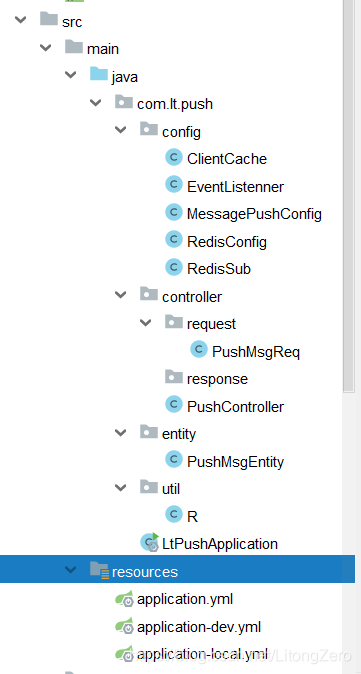热门标签
热门文章
- 1大厂面试题:Springboot可以同时处理多少请求?_springboot支持多少qps
- 2c语言龟兔赛跑程序,c语言龟兔赛跑
- 3MATLAB静止背景下的多目标追踪
- 4树莓派更改python的版本的方法_树莓派中 修改python版本
- 5scanf()函数用法规则探索——c语言,以及%c和%s的语法特性_c语言%s会读入空格吗
- 6一文带你轻松入门Frida框架,编写Hook脚本_frida hook教程
- 7Spring Boot 中操作 Bean 的生命周期
- 8Python每日一练(9)-批量爬取B站小视频_class myspider(object):
- 9【中关村开源生态论坛暨大模型智能应用技术大会】—— 探索AI和开源在未来的应用
- 10Unity场景模型优化技术--LOD和OcclusionCulling_occlusion culling
当前位置: article > 正文
Netty-SocketIO 集群解决方案
作者:小蓝xlanll | 2024-02-15 10:11:01
赞
踩
netty-socketio
Netty-SocketIO 集群解决方案
Netty-SocketIO作为一个Socket框架,使用非常方便,并且使用Netty开发性能也有保证。但是,我在使用
Netty-SocketIO框架时,却发现,国内的资料比较少,虽然有些Demo级别的技术分享,但是关于集群解决方案,并没有什么较好的解决方法。
所以,博主结合GitHub上的Issues,实现了一种集群的解决方案。
一. 解决方案原理
使用Redis订阅\发布模式解决,实现多集群间通讯。
注:
1.官方好像推荐使用Redisson来解决集群问题,有兴趣的同学可以试试,我是没试出来。。
2.最新版Redis支持数据流存储,可通过缓存SocketIOClient来实现,有兴趣的同学可以试试。
二.服务端
使用SpringBoot+Netty-SocketIO+Redis,可通过修改启动端口,模拟多服务端
1.版本
netty-socketio: 1.7.11
spring-boot-: 2.2.1.RELEASE
JDK: 1.8
2.项目结构

3.架构\原理图

3.代码
com.lt.push.config
ClientCache
本地(数据中心)类
package com.lt.push.config; import com.corundumstudio.socketio.SocketIOClient; import org.springframework.stereotype.Component; import java.util.HashMap; import java.util.Map; import java.util.UUID; import java.util.concurrent.ConcurrentHashMap; /** * @author litong * @date 2019/11/6 16:01 */ @Component public class ClientCache { /** * 本地缓存 */ private static Map<String, HashMap<UUID, SocketIOClient>> concurrentHashMap = new ConcurrentHashMap<>(); /** * 存入本地缓存 * * @param userId 用户ID * @param sessionId 页面sessionID * @param socketIOClient 页面对应的通道连接信息 */ public void saveClient(String userId, UUID sessionId, SocketIOClient socketIOClient) { HashMap<UUID, SocketIOClient> sessionIdClientCache = concurrentHashMap.get(userId); if (sessionIdClientCache == null) { sessionIdClientCache = new HashMap<>(); } sessionIdClientCache.put(sessionId, socketIOClient); concurrentHashMap.put(userId, sessionIdClientCache); } /** * 根据用户ID获取所有通道信息 * * @param userId * @return */ public HashMap<UUID, SocketIOClient> getUserClient(String userId) { return concurrentHashMap.get(userId); } /** * 根据用户ID及页面sessionID删除页面链接信息 * * @param userId * @param sessionId */ public void deleteSessionClient(String userId, UUID sessionId) { concurrentHashMap.get(userId).remove(sessionId); } }
- 1
- 2
- 3
- 4
- 5
- 6
- 7
- 8
- 9
- 10
- 11
- 12
- 13
- 14
- 15
- 16
- 17
- 18
- 19
- 20
- 21
- 22
- 23
- 24
- 25
- 26
- 27
- 28
- 29
- 30
- 31
- 32
- 33
- 34
- 35
- 36
- 37
- 38
- 39
- 40
- 41
- 42
- 43
- 44
- 45
- 46
- 47
- 48
- 49
- 50
- 51
- 52
- 53
- 54
- 55
- 56
- 57
- 58
- 59
EventListenner
事件监听/注册中心
package com.lt.push.config; import com.corundumstudio.socketio.AckRequest; import com.corundumstudio.socketio.SocketIOClient; import com.corundumstudio.socketio.annotation.OnConnect; import com.corundumstudio.socketio.annotation.OnDisconnect; import com.corundumstudio.socketio.annotation.OnEvent; import org.springframework.stereotype.Component; import javax.annotation.Resource; import java.util.UUID; /** * @author litong * @date 2019/11/6 15:59 */ @Component public class EventListenner { @Resource private ClientCache clientCache; /** * 客户端连接 * * @param client */ @OnConnect public void onConnect(SocketIOClient client) { String userId = client.getHandshakeData().getSingleUrlParam("userId"); UUID sessionId = client.getSessionId(); clientCache.saveClient(userId, sessionId, client); System.out.println("建立连接"); } /** * 客户端断开 * * @param client */ @OnDisconnect public void onDisconnect(SocketIOClient client) { String userId = client.getHandshakeData().getSingleUrlParam("userId"); clientCache.deleteSessionClient(userId, client.getSessionId()); System.out.println("关闭连接"); } //消息接收入口,当接收到消息后,查找发送目标客户端,并且向该客户端发送消息,且给自己发送消息 // 暂未使用 @OnEvent("messageevent") public void onEvent(SocketIOClient client, AckRequest request) { } }
- 1
- 2
- 3
- 4
- 5
- 6
- 7
- 8
- 9
- 10
- 11
- 12
- 13
- 14
- 15
- 16
- 17
- 18
- 19
- 20
- 21
- 22
- 23
- 24
- 25
- 26
- 27
- 28
- 29
- 30
- 31
- 32
- 33
- 34
- 35
- 36
- 37
- 38
- 39
- 40
- 41
- 42
- 43
- 44
- 45
- 46
- 47
- 48
- 49
- 50
- 51
- 52
MessagePushConfig
Socket线程开启类
package com.lt.push.config; import com.corundumstudio.socketio.Configuration; import com.corundumstudio.socketio.SocketConfig; import com.corundumstudio.socketio.SocketIOServer; import lombok.extern.slf4j.Slf4j; import org.springframework.beans.factory.InitializingBean; import org.springframework.beans.factory.annotation.Autowired; import org.springframework.beans.factory.annotation.Value; import org.springframework.context.annotation.Bean; import org.springframework.stereotype.Component; import javax.annotation.Resource; /** * @author litong * @date 2019/11/1 13:32 */ @Component @Slf4j public class MessagePushConfig implements InitializingBean { @Resource private EventListenner eventListenner; @Value("${push.server.port}") private int serverPort; @Autowired private SocketIOServer socketIOServer; @Override public void afterPropertiesSet() throws Exception { socketIOServer.start(); System.out.println("启动正常"); } @Bean public SocketIOServer socketIOServer() { Configuration config = new Configuration(); config.setPort(serverPort); SocketConfig socketConfig = new SocketConfig(); socketConfig.setReuseAddress(true); socketConfig.setTcpNoDelay(true); socketConfig.setSoLinger(0); config.setSocketConfig(socketConfig); config.setHostname("localhost"); SocketIOServer server = new SocketIOServer(config); server.addListeners(eventListenner); return server; } }
- 1
- 2
- 3
- 4
- 5
- 6
- 7
- 8
- 9
- 10
- 11
- 12
- 13
- 14
- 15
- 16
- 17
- 18
- 19
- 20
- 21
- 22
- 23
- 24
- 25
- 26
- 27
- 28
- 29
- 30
- 31
- 32
- 33
- 34
- 35
- 36
- 37
- 38
- 39
- 40
- 41
- 42
- 43
- 44
- 45
- 46
- 47
- 48
- 49
- 50
- 51
- 52
- 53
- 54
RedisConfig
redis配置订阅\发布模式
package com.lt.push.config; import org.springframework.beans.factory.annotation.Autowired; import org.springframework.context.annotation.Bean; import org.springframework.context.annotation.Configuration; import org.springframework.data.redis.connection.MessageListener; import org.springframework.data.redis.connection.RedisConnectionFactory; import org.springframework.data.redis.core.RedisTemplate; import org.springframework.data.redis.listener.PatternTopic; import org.springframework.data.redis.listener.RedisMessageListenerContainer; import org.springframework.data.redis.serializer.RedisSerializer; import org.springframework.data.redis.serializer.StringRedisSerializer; /** * @author litong * @date 2019/10/17 14:33 */ @Configuration public class RedisConfig { @Autowired private RedisTemplate redisTemplate; @Bean public RedisTemplate<String, Object> stringSerializerRedisTemplate() { RedisSerializer<String> stringSerializer = new StringRedisSerializer(); redisTemplate.setKeySerializer(stringSerializer); redisTemplate.setValueSerializer(stringSerializer); redisTemplate.setHashKeySerializer(stringSerializer); redisTemplate.setHashValueSerializer(stringSerializer); return redisTemplate; } @Bean(destroyMethod = "destroy") public RedisMessageListenerContainer redisMessageListenerContainer(RedisConnectionFactory factory, MessageListener redisMessageListener) { RedisMessageListenerContainer container = new RedisMessageListenerContainer(); container.setConnectionFactory(factory); //可以添加多个 messageListener container.addMessageListener(redisMessageListener, new PatternTopic("index")); return container; } }
- 1
- 2
- 3
- 4
- 5
- 6
- 7
- 8
- 9
- 10
- 11
- 12
- 13
- 14
- 15
- 16
- 17
- 18
- 19
- 20
- 21
- 22
- 23
- 24
- 25
- 26
- 27
- 28
- 29
- 30
- 31
- 32
- 33
- 34
- 35
- 36
- 37
- 38
- 39
- 40
- 41
- 42
- 43
- 44
RedisSub
redis发布配置
package com.lt.push.config; import com.alibaba.fastjson.JSONObject; import com.corundumstudio.socketio.SocketIOClient; import com.lt.push.entity.PushMsgEntity; import lombok.extern.slf4j.Slf4j; import org.springframework.beans.factory.annotation.Autowired; import org.springframework.data.redis.connection.Message; import org.springframework.data.redis.connection.MessageListener; import org.springframework.data.redis.core.RedisTemplate; import org.springframework.stereotype.Service; import org.springframework.util.StringUtils; import javax.annotation.Resource; import java.util.HashMap; import java.util.UUID; /** * @author litong * @date 2019/10/17 15:33 */ @Service(value = "redisMessageListener") @Slf4j public class RedisSub implements MessageListener { @Resource private ClientCache clientCache; @Autowired private RedisTemplate<String, Object> redisTemplate; @Override public void onMessage(Message message, byte[] pattern) { String msgString = (String) redisTemplate.getValueSerializer().deserialize(message.getBody()); PushMsgEntity pushMsgEntity = JSONObject.parseObject(msgString, PushMsgEntity.class); String channel = (String) redisTemplate.getValueSerializer().deserialize(message.getChannel()); if (!StringUtils.isEmpty(channel) && !StringUtils.isEmpty(pushMsgEntity)) { // 向客户端推送消息 HashMap<UUID, SocketIOClient> userClient = clientCache.getUserClient(pushMsgEntity.getUid()); if (userClient != null && !userClient.isEmpty()) { userClient.forEach((uuid, socketIOClient) -> { socketIOClient.sendEvent("chatevent", pushMsgEntity.getMessage()); }); } } } }
- 1
- 2
- 3
- 4
- 5
- 6
- 7
- 8
- 9
- 10
- 11
- 12
- 13
- 14
- 15
- 16
- 17
- 18
- 19
- 20
- 21
- 22
- 23
- 24
- 25
- 26
- 27
- 28
- 29
- 30
- 31
- 32
- 33
- 34
- 35
- 36
- 37
- 38
- 39
- 40
- 41
- 42
- 43
- 44
- 45
- 46
- 47
com.lt.push/controller
PushMsgReq
Req请求类
package com.lt.push.controller.request;
import lombok.Data;
/**
* @author litong
* @date 2019/11/13 16:44
*/
@Data
public class PushMsgReq {
private String uid;
private String msg;
}
- 1
- 2
- 3
- 4
- 5
- 6
- 7
- 8
- 9
- 10
- 11
- 12
- 13
- 14
PushController
推送消息控制层
package com.lt.push.controller; import com.alibaba.fastjson.JSON; import com.lt.push.controller.request.PushMsgReq; import com.lt.push.entity.PushMsgEntity; import lombok.AllArgsConstructor; import lombok.extern.slf4j.Slf4j; import org.springframework.data.redis.core.RedisTemplate; import org.springframework.web.bind.annotation.PostMapping; import org.springframework.web.bind.annotation.RequestBody; import org.springframework.web.bind.annotation.RequestMapping; import org.springframework.web.bind.annotation.RestController; /** * @author litong * @date 2019/11/6 16:02 */ @RestController @RequestMapping("/push") @AllArgsConstructor @Slf4j public class PushController { private RedisTemplate redisTemplate; @PostMapping("/user") public String pushUser(@RequestBody PushMsgReq pushMsgReq) { // 接受消息,存储到MongoDB中, // 发布到redis中 PushMsgEntity pushMsgEntity = PushMsgEntity.builder() .uid(pushMsgReq.getUid()).message(pushMsgReq.getMsg()).build(); redisTemplate.convertAndSend("index", JSON.toJSONString(pushMsgEntity)); return "success"; } }
- 1
- 2
- 3
- 4
- 5
- 6
- 7
- 8
- 9
- 10
- 11
- 12
- 13
- 14
- 15
- 16
- 17
- 18
- 19
- 20
- 21
- 22
- 23
- 24
- 25
- 26
- 27
- 28
- 29
- 30
- 31
- 32
- 33
- 34
- 35
- 36
- 37
entity
PushMsgEntity
推送实体类
package com.lt.push.entity; import lombok.AllArgsConstructor; import lombok.Builder; import lombok.Data; import lombok.NoArgsConstructor; /** * @author litong * @date 2019/11/12 16:24 */ @Data @Builder @NoArgsConstructor @AllArgsConstructor public class PushMsgEntity { private String uid; private String message; }
- 1
- 2
- 3
- 4
- 5
- 6
- 7
- 8
- 9
- 10
- 11
- 12
- 13
- 14
- 15
- 16
- 17
- 18
- 19
- 20
- 21
util
R
返回数据格式类
package com.lt.push.util; import lombok.Data; /** * @author litong * @date 2019/11/10 15:15 */ @Data public class R<T> { private Integer code; private String msg; private T data; public static <T> R<T> ok() { return restResult(null, 1000, "成功"); } public static <T> R<T> ok(T data) { return restResult(data, 1000, null); } private static <T> R<T> restResult(T data, int code, String msg) { R<T> apiResult = new R<>(); apiResult.setCode(code); apiResult.setData(data); apiResult.setMsg(msg); return apiResult; } }
- 1
- 2
- 3
- 4
- 5
- 6
- 7
- 8
- 9
- 10
- 11
- 12
- 13
- 14
- 15
- 16
- 17
- 18
- 19
- 20
- 21
- 22
- 23
- 24
- 25
- 26
- 27
- 28
- 29
- 30
- 31
- 32
- 33
- 34
LtPushApplication
启动类
package com.lt.push;
import org.springframework.boot.SpringApplication;
import org.springframework.boot.autoconfigure.SpringBootApplication;
@SpringBootApplication
public class LtPushApplication {
public static void main(String[] args) {
SpringApplication.run(LtPushApplication.class, args);
}
}
- 1
- 2
- 3
- 4
- 5
- 6
- 7
- 8
- 9
- 10
- 11
- 12
- 13
- 14
resources
配置文件
application.yml
spring:
application:
name: lt-push
profiles:
active: local
- 1
- 2
- 3
- 4
- 5
- 6
application-local.yml
server:
port: 8081
spring:
redis:
host: localhost
port: 6379
password:
# 推送服务、地址端口
push:
server:
host: localhost
port: 8082
- 1
- 2
- 3
- 4
- 5
- 6
- 7
- 8
- 9
- 10
- 11
- 12
- 13
三.客户端
使用网页模拟,可自行修改客户端代码,模拟多用户
为了方便,socket.io.js,我直接使用的线上的,可自行下载后放到项目中
端口可根据实际进行修改,在控制台查看推送信息
<script src="https://cdn.bootcss.com/socket.io/2.1.1/socket.io.js"></script> <script type="text/javascript"> // 此处userId为用户标识,后面推送时使用 var socket = io.connect('http://localhost:8082?userId=1', { 'reconnection delay' : 2000, 'force new connection' : true }); socket.on('message', function(data) { // here is your handler on messages from server console.log(data) }); socket.on('chatevent', function(data) { // here is your handler on chatevent from server console.log(data) }); socket.on('connect', function() { // connection established, now we can send an objects // send json-object to server // '@class' property should be defined and should // equals to full class name. var obj = { '@class' : 'com.sample.SomeClass' } socket.json.send(obj); // send event-object to server // '@class' property is NOT necessary in this case var event = { } socket.emit('someevent', event); }); </script>
- 1
- 2
- 3
- 4
- 5
- 6
- 7
- 8
- 9
- 10
- 11
- 12
- 13
- 14
- 15
- 16
- 17
- 18
- 19
- 20
- 21
- 22
- 23
- 24
- 25
- 26
- 27
- 28
- 29
- 30
- 31
- 32
- 33
- 34
- 35
- 36
- 37
- 38
- 39
- 40
四.测试
模拟集群:启动多个Java服务器,端口不一样即可
模拟多客户:副本多个页面,配置ip不一样即可
接口测试用例
POST http://127.0.0.1:8083/push/user
Accept: application/json
Content-Type: application/json
{
"uid": "2",
"msg": "这是服务1给2发的"
}
- 1
- 2
- 3
- 4
- 5
- 6
- 7
- 8
五.源码下载
GitHub地址
觉得不错可以给我点个star/赞。
小小赞助,谢谢!

本文内容由网友自发贡献,转载请注明出处:【wpsshop博客】
推荐阅读
相关标签



